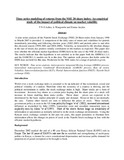| dc.description.abstract | A time series analysis of the Nairobi Stock Exchange (NSE) 20-Share index from January 1998 to March 2007 is provided. A comparison of the daily rates of return and volatilities for periods immediately preceding and following election years (2002-2003) and periods prior to and after this electoral season (1998-2001 and 2004-2006). Volatility, as measured by the absolute change in the rate of return, has positive serially correlations in the markets as expected. This paper also tests whether the efficient market hypothesis (EMH) hold in the case of the NSE 20 share index. The results indicate that this hypothesis is not satisfied as in this paper both the ARIMA(1,1,1) and the GARCH(1,1) models are fit to the data. The random walk process that holds under the EMH does not hold for this data. Prediction for the NSE index for a range of periods is given. | en |

